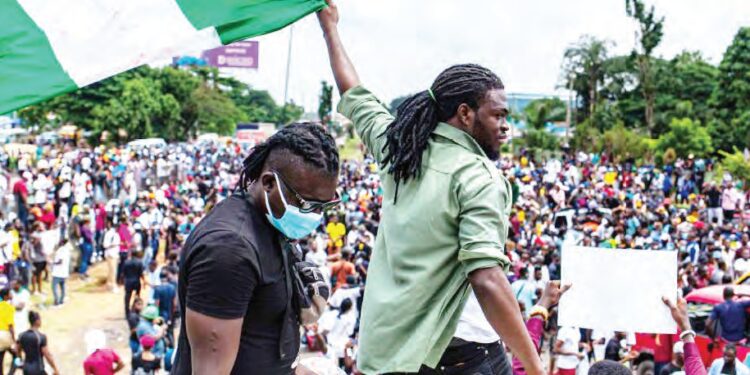The planned protest proposed by the organisers to commence on the 1st August 2024 should be discouraged and immediately aborted, because in my opinion no good will come out of it and for the reasons that I will give later. The President has pleaded for the abandonment of the planned protest and have assured Nigerians that, he is working hard to cushion hardship.
However, the Former vice president and presidential candidate of the Peoples Democratic Party (PDP), Atiku Abubakar, has thrown his weight behind the planned nationwide protests against hunger and widespread hardship in Nigeria, scheduled to begin on August 1 2024. Former Vice President Atiku Abubakar has come out strongly in defence of Nigerians’ right to protest, emphasising that this right is enshrined in the Nigerian Constitution and affirmed by the courts.
Public protest is considered a fundamental right and a human right. The right to freedom of assembly and peaceful protest is protected under various international human rights instruments, such as the Universal Declaration of Human Rights and the International Covenant on Civil and Political Rights. The writer recognizes the importance of individuals being able to gather, express their opinions, and peacefully protest in public spaces. Freedom of assembly and peaceful protest are integral to a democratic society, as they allow citizens to exercise their right to freedom of expression and to participate in public discourse. However, it is important to note that while public protest is a fundamental right, there may be restrictions and regulations imposed by the government to ensure public safety and order.
Natural Law theorists view human rights in the abstract. According to them human rights are the specie of rights which can be said to inhere in every human being. Since they are regarded as inalienable and immutable, such rights cannot be taken away from any person without affront to justice. See Chief (Mrs) Olu Funmilayo Ransome-Kuti & Ors. V. Attorney-General of the Federation (1985) 6 SC 245 at 276-277, Eso J.S.C examined the nature of the fundamental rights and stated’ ’this is no doubt a right guaranteed to everyone by the Constitution’’. Eze Onyekpere Esq put the issue in proper context when he said;
‘Human rights as a social fact can be viewed as normative responses to expression of oppression and domination. They represent the minimum living standards for civilised humanity; to wit: they are the morality of the depts rather than the morality of the heights. They are won through struggles of the oppressed against their oppressors,’ (JHRLP, Vol 5 No 1 January 1999 P.13 at 30). Therefore, Nigerian people have the constitutionally guaranteed rights to protest against any perceived injustice.
Public protest in Nigeria refers to the act of gathering and expressing discontent or grievances by citizens in a public setting. It is a form of expressing dissatisfaction or demanding change in various aspects of society, such as government policies, social issues, economic conditions, or human rights violations. Public protests can take the form of peaceful demonstrations, rallies, sit-ins, or marches, where people come together to voice their concerns and advocate for the issues, they believe in. These public protests often aim to raise awareness, put pressure on the authorities, or bring about social and political change. We have also witnessed these protests being hijacked by politicians and recalcitrant individuals for selfish and reprehensible reasons.
Determining whether a proposed public strike in Nigeria on the weak economy is a good thing or not is subjective and depends on individual perspectives. Here are a few points to consider:
Pros of the Strike:
1. Raising Awareness: A public strike can bring attention to the issues related to the weak economy in Nigeria. It can serve as a platform for citizens to voice their concerns and demand immediate action from the government and other relevant stakeholders.
2. Pressure for Change: A large-scale strike can create pressure on the government to address the economic challenges, implement reforms, and take steps to improve the economy. It can be a catalyst for necessary changes and policies to stimulate economic growth.
3. Solidarity and Unity: Strikes can foster a sense of solidarity among citizens who are affected by the weak economy. It can bring people together and encourage collective action towards finding solutions and advocating for a better economic environment.
Cons of the Strike:
1. Disruption and Inconvenience: Strikes often lead to disruptions in daily life, affecting businesses, public services, transportation, and individuals who are not directly involved. This can cause inconvenience and economic losses in the short term that directly or indirectly affects all Nigerians.
2. Potential for Violence and Unrest: Strikes can sometimes escalate into violence or clashes between protesters and security forces. This can lead to safety concerns, property damage, and a deterioration of the overall social and economic environment, for example as experienced during the ENDSARS PROTEST and the current situation in Kenya.
3. Negotiations and Compromise: While strikes can draw attention to economic issues, successful resolution often requires negotiation and compromise between the concerned parties. Finding long-term solutions to economic challenges may necessitate dialogue, collaboration, and concerted efforts from multiple stakeholders, like the recent minimum wage issues.
Conclusion.
It is essential to consider both the potential benefits and drawbacks of a proposed strike on the present weak economy in Nigeria. Public opinion, the intentions of the organizers, and the government’s response will also play significant roles in shaping the outcomes and impact of such an action. The Federal Government should not use force or any illegal intimidating methods to stifle the protest. However, if the organisers insist on carrying out the planned protest, adequate protection and guidelines should be worked to prevent any unplanned outcome and security issues that may occur or injuries to the protesters.
The Federal Government has done well so far to deal with the conditions necessitating the planned protest and still continue to do more to change the current bad economic situation in Nigeria, for example, The Federal Government has approved N5 billion for each state and the Federal Capital Territory (FCT) to enable them to procure food items for distribution to the poor in their respective states. The recent donation of about 20 trucks of rice to each of Nigeria’s 36 states and Abuja as part of measures to cushion the country’s food crisis. The Federal Government has commenced the process to concession 22 out of it 33 silo complexes across the country to the private sector. Government said the concession of its silos would ensure availability of affordable grains across the country.
The Federal government has finally started disbursing funds from the N200 billion Presidential Conditional Grant Scheme. This scheme aims to support manufacturers and small businesses across the country, offering much-needed relief after recent economic reforms. This is just to mention a few and other palliatives in place and including several micro and macro-economic measures. It appears that whilst some States are deploying these resources received from the Federal Government to ameliorate the economic hardship prevalent in the country today, some other states are diverting them and using them for their personal use.
The Youths and the country should focus and work together on improving the current hardship all over the country by not participating in the scheduled public protest, this is not the time for any public protest that has the potential of shutting down the country. It is also well-intentioned to note, the supportive comments and public statements by the Inspector General of Police for a peaceful protest. I am against any public protest at this time in Nigeria.
Charles Ude, Esq
Abuja Based Legal Practitioner


